| Pages:
1
2
3
4
5
6
..
18 |
Laboratory of Liptakov
International Hazard
    
Posts: 1411
Registered: 2-9-2014
Location: Technion Haifa
Member Is Offline
Mood: old jew
|
|
For measurement of brisance of any amateur detonator, is steel plate base condition. Usually 1 - 2 mm of thickness. It give clear result. Wood cavity
is nonsense.
Development of primarily - secondary substances CHP (2015) Lithex (2022) Brightelite (2023) Nitrocelite and KC primer (2024)
|
|
|
FeedMe94
Hazard to Self
 
Posts: 87
Registered: 1-4-2017
Member Is Offline
Mood: No Mood
|
|
You are right i just didnt have something to test on. I just tested 500mg ETN and 500mg ETN + 150mg SADS on 2mm steel. Non of them penetrated it.
1) ETN wasnt pressed
2) The centrifuge plastic tube have round bottom so it didnt make full contact on metal
I will get 1mm steel plate and also i will melt the bottom of the plastic tube to make it flat and i will repeat the test
|
|
|
Laboratory of Liptakov
International Hazard
    
Posts: 1411
Registered: 2-9-2014
Location: Technion Haifa
Member Is Offline
Mood: old jew
|
|
Lead block measurement
Much better is Lead block. You can use repeately. All energy is discharged into material, without loss in some hole. In metal plate is usually hole.
In Lead block not. Crater give an clear result about all energy from destruction device. Almost entire energy is catched in lead. And is it pretty
nice. As some crater on the Moon.
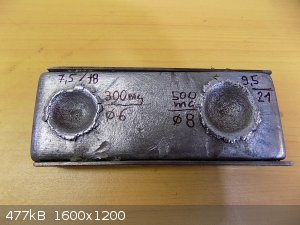
For example, at same conditions (500 mg output segment) has CHP smaller brizancion than ETN. But CHP is not molecular explosive. Only salt + Fuel.
CHP not require some next primary mixture for reliable start. Works as primary and secondary as 2 in 1.
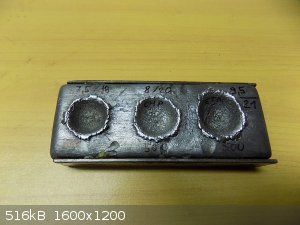
[Edited on 17-4-2019 by Laboratory of Liptakov]
Development of primarily - secondary substances CHP (2015) Lithex (2022) Brightelite (2023) Nitrocelite and KC primer (2024)
|
|
|
Laboratory of Liptakov
International Hazard
    
Posts: 1411
Registered: 2-9-2014
Location: Technion Haifa
Member Is Offline
Mood: old jew
|
|
Next serie of tests show different properties of tested materials and his mixtures. Weak is mixture TACP/ glycine from recrystall process.
Tests on the lead block show an clear difference. If used steel plate, is difficulty find a clear difference between samples. Highest energy has of
course pure ETN (above) . Follows....... ETN/CHP......CHP....... CGP. Values in mm/grams..... ...LL ...LL
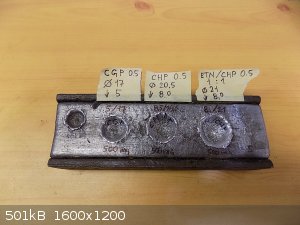
Development of primarily - secondary substances CHP (2015) Lithex (2022) Brightelite (2023) Nitrocelite and KC primer (2024)
|
|
|
MineMan
International Hazard
    
Posts: 1014
Registered: 29-3-2015
Member Is Offline
Mood: No Mood
|
|
Very cool! Would be curious about PETN and nano Al. Which can be set off by a low powered laser (1watt) no primary needed.
|
|
|
FeedMe94
Hazard to Self
 
Posts: 87
Registered: 1-4-2017
Member Is Offline
Mood: No Mood
|
|
Quote: Originally posted by MineMan  | | Very cool! Would be curious about PETN and nano Al. Which can be set off by a low powered laser (1watt) no primary needed. |
Wow , i didn't know that. I have PENT and atomized Al. I will try it soon
|
|
|
MineMan
International Hazard
    
Posts: 1014
Registered: 29-3-2015
Member Is Offline
Mood: No Mood
|
|
Yes. It’s a big deal for advancement of laser detonators. Let us know your results. 5% Al is the prescription. I believe the paper was in EPP a few
months ago...
I don’t know optics well enough to focus a laser after fiber optic cable though...
A single mode diode can focus the smallest. Best bet would be the 900mw 405nm singlemode didoe.
|
|
|
Laboratory of Liptakov
International Hazard
    
Posts: 1411
Registered: 2-9-2014
Location: Technion Haifa
Member Is Offline
Mood: old jew
|
|
Optical cable inserted instead fuse? Maybe is time buy some laser...... ...LL ...LL
Development of primarily - secondary substances CHP (2015) Lithex (2022) Brightelite (2023) Nitrocelite and KC primer (2024)
|
|
|
MineMan
International Hazard
    
Posts: 1014
Registered: 29-3-2015
Member Is Offline
Mood: No Mood
|
|
Correct LL. Fiber optic cable insstead of fuse or wire!
|
|
|
twelti
Hazard to Others
  
Posts: 217
Registered: 20-2-2019
Member Is Offline
|
|
I wonder if a beam expander (which actually help focus to a small spot at a distance) and a higher power laser would work at moderate distances
without the FO cable? I have a 1 watt blue laser that I have used many times to set off small charges of AP from about 8 feet.
|
|
|
MineMan
International Hazard
    
Posts: 1014
Registered: 29-3-2015
Member Is Offline
Mood: No Mood
|
|
Quote: Originally posted by twelti  |
I wonder if a beam expander (which actually help focus to a small spot at a distance) and a higher power laser would work at moderate distances
without the FO cable? I have a 1 watt blue laser that I have used many times to set off small charges of AP from about 8 feet.
|
My guess is for detonation is must be very small. Let me look up the paper.
|
|
|
deadpool
Harmless

Posts: 21
Registered: 13-3-2014
Member Is Offline
Mood: No Mood
|
|
Hello,
This is a question for XeonTheMGPony, have you tried using commercial primers for caps instead of re-inventing the wheel? Don't get me wrong, you have
done a great job, but I wonder if a normal primer could be adapted to be used electrically for your caps?
|
|
|
wessonsmith
Hazard to Others
  
Posts: 203
Registered: 15-2-2018
Location: elsewhere
Member Is Offline
|
|
Why not reinvent the wheel?
My det caps are both safe to load and have zero shrapnel risk. Yes, I needed to reinvent the wheel, but that's the fun of it.
https://drive.google.com/open?id=1d0D9WVLlj-MpjEukyICJDtty6C...
[Edited on 30-11-2019 by wessonsmith]
|
|
|
XeonTheMGPony
International Hazard
    
Posts: 1640
Registered: 5-1-2016
Member Is Offline
Mood: No Mood
|
|
Quote: Originally posted by deadpool  | Hello,
This is a question for XeonTheMGPony, have you tried using commercial primers for caps instead of re-inventing the wheel? Don't get me wrong, you have
done a great job, but I wonder if a normal primer could be adapted to be used electrically for your caps? |
what do you mean by primer? Atm I use all industry standard systems.
I just make them my self as due to the idiocy of our laws here.
Mine are perfectly safe as well, you have to be rather spectacularly stupid to injure your self with one, IE safety is in the person not the substance
[Edited on 2-12-2019 by XeonTheMGPony]
|
|
|
orbitalchemtech
Harmless

Posts: 1
Registered: 12-11-2019
Member Is Offline
Mood: Super Critical
|
|
Quote: Originally posted by XeonTheMGPony  | Why re-invent the wheel, industry standard practices, over 60,000,000 million made a year with very few if any defective units or detonations
unintended.
Do research, pick a form factor, make some basic tools and be don with it.
I use two standard of tubing, 7mm od 6.5mm ID or 6mm Od, and 5.5 ID
I get high quality nails, then lath them down to the size of the tube then a hair more to allow clearance and that has a paper spacer to ensure the
metal never makes contact to the tube.
Base charge is pressed in, primary charge is pressed into a solid paper tube that firmly fits in the tube, so on.
Very safe, very reliable, very simple, and each stage can be don on mass.
What gets you in danger is changing things up all the time, not having a solid system in place, and good job specific tooling, it doesn't need to be
fancy or high tech, it just need be made for the task at hand |
A pneumatic cylinder works well for a press and can be activated remotely so there is no danger from pressing operations and with added blast shields
if an accident occurs shrapnel is directed in a safe direction. Tooling is easily made from some wood and dowels and pressure can be adjusted with
regulator to get desired force I think pressing anything by hand is risky business
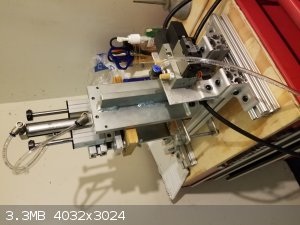 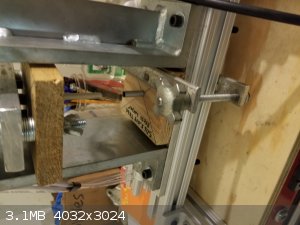
|
|
|
Hey Buddy
Hazard to Others
  
Posts: 441
Registered: 3-11-2020
Location: Bushwhacker Country
Member Is Offline
|
|
I'm new on sm but something I've noticed that isn't common here but is the standard in mds demolition is the use of dual priming. There is basically
no scenario where a charge would not be primed with dual caps for a blast. Even on command dets and time delay, engineers always use two caps for
redundancy. If one cap fails the second fire succeeds assuming known components are being used. I should mention that the use of dual caps can be
tricky in situations with Shocktube. Ive seen a dual prime using a Shocktube primary detonator cap and a fused secondary cap. If the time fuze is lit
and the shocktube isn't detonated before the time fuze runs out, the detonation will travel backwards up the shocktube and detonate the primer
initiator in the wrong direction, injuring the user. I dont think ppl here are making shock tube but I thought it was worth mentioning as I saw it
happen in demolition and it really confused everyone when it occured.
|
|
|
Pyro_cat
Hazard to Others
  
Posts: 243
Registered: 30-4-2018
Member Is Offline
Mood: No Mood
|
|
Still way to scaredy-cat to think about packing a primary in a metal tube.
How about filling it with primary wile its still wet then adding a drying agent of some sort on top to pull the water out after you are all done ?
Suppose the water could make some primaries react with the tube.
Just an idea I thought of, I am not doing it.
|
|
|
ManyInterests
National Hazard
   
Posts: 942
Registered: 19-5-2019
Member Is Offline
|
|
I wish I was here last year, as WessonSmith is gone and his google drive links are now dead.
But that being said, I need to ask about strategies to load a blasting cap without any special equipment. I plan on using the body of a ballpoint pen
(one end sealed with hot glue) and use either picric acid or ETN as the secondary with NHN as the primary, topping it with black powder as the igniter
and setting it off with an electric match.
My electric match design is a bit different than most people here. I use regular match (or two if I can fit it in the cap) and wrap the matchheads
with 0.1mm or 0.08mm nichrome wire. I've built dozens of them for practice and they all reliably fired up.
The reason why I want to use a plastic pen body is A: It's easier and quicker to get than a metal tube, B: it's chemically inert, so I don't have to
worry about the energetics reacting in any way that would destabilize the thing. C: because it's transparent, I can see how everything looks on the
inside.
My biggest fear right now is how to press everything without it exploding. Normally I prefer to find a video of something like this before going
forward. While I've been able to find plenty of video from chemistry YouTubers going into great detail on how everything works. The actual
construction of a blasting cap is reduced to one Indian fellow making one out of cardboard... and pressing everything by hand. The video had him use
mercury fulminate as the primary. I have no access to that and I would not dare use any. Let alone do the pressing with my bare hands.
I looked through the improvised munitions handbook and what I saw there is making a wooden apparatus for press the cap, but there is no way I can
construct that.
I suppose if I spent more money on electrical components I can built an Arduino operated arm to remotely do the pressing, but I don't know exactly how
much pressure I need to do. Laboratory of Liptakov had a picture posted in a different thread that showed ETN pressed at 100 kg and then another
charge at 1 kg. I don't know how that is in practice.
I apologize for being so verbose or coming off as intense. But I find this really fascinating and I really want to do this, but I also don't want to
lose any fingers/hands and cause alarm with an inappropriate bang.
|
|
|
Brightthermite
Hazard to Others
  
Posts: 133
Registered: 26-6-2019
Member Is Offline
|
|
I cant speak for picric acid but your totally good to hand press ETN. In fact the guy your referring too use to have a video up of him hand pressing
his ETN/NHN caps and pounding on them using a hammer and wooden dowel.
Hand press the ETN and dump some NHN on top and as long as its sealed up well it should detonate fine. I never press my caps much and they perform
fine. That being said, ETN pressed to 100kg with pressed NHN would perform much better but...
If your still wanting to achieve high loading pressures look into getting something like an Arbor press. Purchase a bit of sheet metal to fabricate a
shield and you should be good to go.
You said your fear was the caps exploding, you should try to build a system where you'd have no problem smacking caps inside and setting them off
initially. Make it safe enough that it wont be a problem
[Edited on 20-10-2021 by Brightthermite]
|
|
|
ManyInterests
National Hazard
   
Posts: 942
Registered: 19-5-2019
Member Is Offline
|
|
Quote: Originally posted by Brightthermite  | I cant speak for picric acid but your totally good to hand press ETN. In fact the guy your referring too use to have a video up of him hand pressing
his ETN/NHN caps and pounding on them using a hammer and wooden dowel.
Hand press the ETN and dump some NHN on top and as long as its sealed up well it should detonate fine. I never press my caps much and they perform
fine. That being said, ETN pressed to 100kg with pressed NHN would perform much better but...
If your still wanting to achieve high loading pressures look into getting something like an Arbor press. Purchase a bit of sheet metal to fabricate a
shield and you should be good to go.
You said your fear was the caps exploding, you should try to build a system where you'd have no problem smacking caps inside and setting them off
initially. Make it safe enough that it wont be a problem
[Edited on 20-10-2021 by Brightthermite] |
The video of him handloading and pressing det caps is not up anymore. If it is up somewhere I sure cannot find it.
And no, I don't really need it to be that tightly pressed. As much as I enjoy the challenge of working around the dangers of this hobby. My end goal
is just to make one or two blasting caps. A small charge, and go out in to the middle of nowhere and set them off. It's just a personal challenge to
see if I can 'do' it, if you know what I mean.
I don't want to get an arbor press. It's a bit overkill for my purposes. I also really like to do some arts and crafts (my username is ManyInterests
for a reason), and I think a simple hydraulic press like this will do.
https://www.youtube.com/watch?v=u7My4pUk8A4
It's childish I know, but I've seen people make those than can crack walnuts.
The other thing is that I cannot afford to have any caps go off in my apartment. I live in an apartment in a crowded area and will attract a lot of
unwanted attention. I mentioned it many times in my previous posts and I just really don't want to alarm anyone while doing this.
But if you're saying that gentle hand pressing is sufficient and completely safe with ETN and the NHN on top of it (and the black powder igniter on
top of that) then that is a load off my mind. I just need to do a little research to make sure that any static electricity made is neglible.
My plastic pen might be a little longer for it's purposes, but as long as it can hold the 2 to 2.5 grams of energetics it should be good. if is too
long I'll trim it down afterwards before inserting my electric match and sealing the top with epoxy.
I am using very long wires (3 meters) connected to a 433 mhz remote switch module. This will allow me to setup my electronics a decent distance from
detonation and the remote switch will allow me to be even further and observe in complete safety from any possible flying debris.
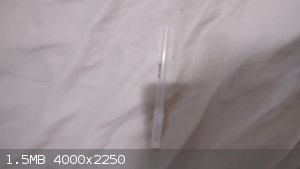
|
|
|
Brightthermite
Hazard to Others
  
Posts: 133
Registered: 26-6-2019
Member Is Offline
|
|
I completely understand, I would love to have a way to press my caps to max density or melt cast them.
Once again I cant speak for the NHN but the ETN should have no trouble with static. I have loaded it in all different types of plastic and metal
containers with no issue.
If your looking to keep it quiet and no shrapnel, saw dust is your friend. I have a plastic tote and a 5 gallon trash bag full of saw dust that I test
caps in. There is next to no noise. Place it in the tote and cover the cap with the bag.
|
|
|
Laboratory of Liptakov
International Hazard
    
Posts: 1411
Registered: 2-9-2014
Location: Technion Haifa
Member Is Offline
Mood: old jew
|
|
Brightthermite say truth. Sound is same a like banging of the door...
Development of primarily - secondary substances CHP (2015) Lithex (2022) Brightelite (2023) Nitrocelite and KC primer (2024)
|
|
|
ManyInterests
National Hazard
   
Posts: 942
Registered: 19-5-2019
Member Is Offline
|
|
That is very good. I was thinking of getting a 5 gallon bucket and filling it with kitty litter. I don't know where exactly to get saw dust since I
never looked, but I will search for it.
Safety first, safety second, and safety third. The results will follow, but you need to be in a proper condition to report on them.
| Quote: | Brightthermite say truth. Sound is same a like banging of the door...
|
Also, Laboratory of Liptakov, I have some questions. I saw your videos (and downloaded them!) on plasticizing things. They answered soooo many
questions I had regarding making plasticized energetics.
But I got questions: Firstly when you soaked the Scapa tape in gasoline to extract the rubber, is it the same gasoline you get the from the gas
station? Would lighter fluid like Zippo or ronsonol also work for that? Also you used toluene and acetone mixed in a 1:1 ratio. Would xylene work? I
can get toluene, but it's much easier to get some xylene.
What do you think of using rubber cement and bar & chain oil as a plasticizer?
|
|
|
Laboratory of Liptakov
International Hazard
    
Posts: 1411
Registered: 2-9-2014
Location: Technion Haifa
Member Is Offline
Mood: old jew
|
|
1)Is possible use any gasoline, but results will worse. Stink, aggressive additives which can decompose black carrier. Best is gasoline for
cleaning, thus relatively pure heptane. From Amazon cleaning gasoline.
2) Xylene was not tested, necessary try it.
3) Rubber cement was not tested. According some comments, results are worse than with Scapa 2501. Hard consistency within a few days.
4) Chain oil was not tested. According his formula, results can be worse than with quality oil 5W40.
Development of primarily - secondary substances CHP (2015) Lithex (2022) Brightelite (2023) Nitrocelite and KC primer (2024)
|
|
|
ManyInterests
National Hazard
   
Posts: 942
Registered: 19-5-2019
Member Is Offline
|
|
| Quote: | 3) Rubber cement was not tested. According some comments, results are worse than with Scapa 2501. Hard consistency within a few days.
4) Chain oil was not tested. According his formula, results can be worse than with quality oil 5W40.
|
The rubber cement and bar and chain oil are used together. While I will agree that they are not as good. Getting the gasoline and scapa 2501 are very
difficult for me while the rubber cement and bar and chain are very readily available. I guess I'll have to work with what I have.
|
|
|
| Pages:
1
2
3
4
5
6
..
18 |